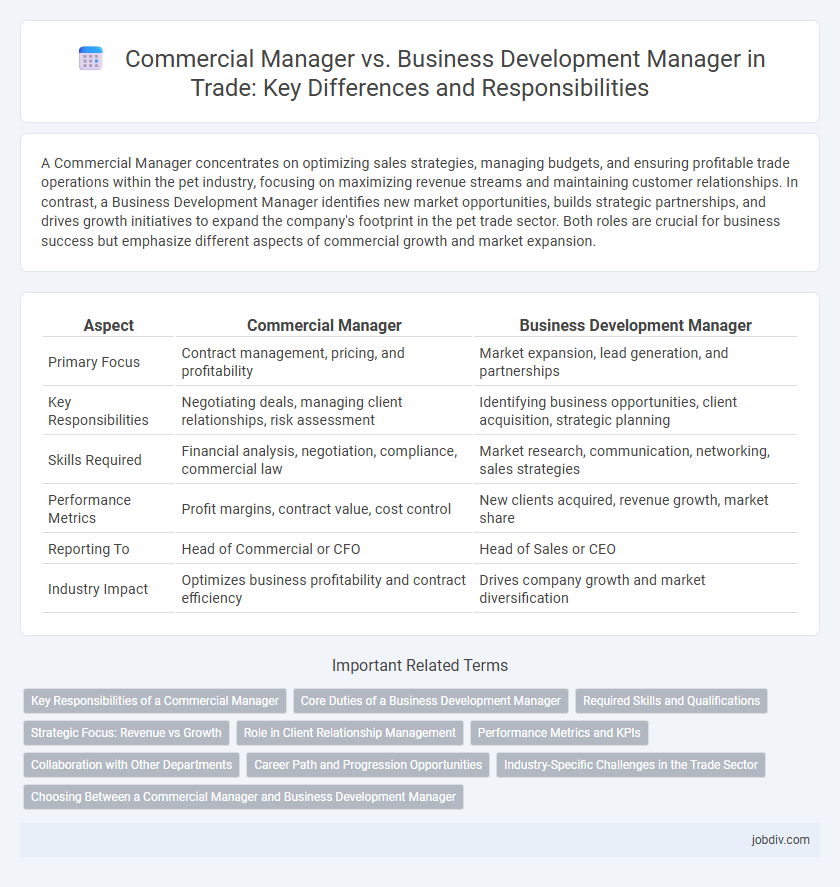A Commercial Manager concentrates on optimizing sales strategies, managing budgets, and ensuring profitable trade operations within the pet industry, focusing on maximizing revenue streams and maintaining customer relationships. In contrast, a Business Development Manager identifies new market opportunities, builds strategic partnerships, and drives growth initiatives to expand the company's footprint in the pet trade sector. Both roles are crucial for business success but emphasize different aspects of commercial growth and market expansion.
Table of Comparison
| Aspect | Commercial Manager | Business Development Manager |
|---|---|---|
| Primary Focus | Contract management, pricing, and profitability | Market expansion, lead generation, and partnerships |
| Key Responsibilities | Negotiating deals, managing client relationships, risk assessment | Identifying business opportunities, client acquisition, strategic planning |
| Skills Required | Financial analysis, negotiation, compliance, commercial law | Market research, communication, networking, sales strategies |
| Performance Metrics | Profit margins, contract value, cost control | New clients acquired, revenue growth, market share |
| Reporting To | Head of Commercial or CFO | Head of Sales or CEO |
| Industry Impact | Optimizes business profitability and contract efficiency | Drives company growth and market diversification |
Key Responsibilities of a Commercial Manager
A Commercial Manager primarily oversees contract negotiation, pricing strategies, and risk management to maximize profitability and ensure compliance with trade regulations. They analyze market trends, manage supplier relationships, and coordinate closely with sales and procurement teams to optimize commercial performance. Their role ensures that commercial agreements align with organizational goals and deliver sustainable revenue growth.
Core Duties of a Business Development Manager
A Business Development Manager primarily focuses on identifying new market opportunities, building strategic partnerships, and driving revenue growth through client acquisition and retention strategies. Their core duties include market research, relationship management, and negotiating contracts to expand the company's customer base. This role contrasts with a Commercial Manager, who oversees commercial strategy, pricing, and contract compliance.
Required Skills and Qualifications
Commercial Managers require strong negotiation skills, financial acumen, and expertise in contract management to effectively oversee sales and procurement processes. Business Development Managers need outstanding communication abilities, strategic thinking, and market analysis proficiency to identify growth opportunities and foster client relationships. Both roles demand a solid understanding of industry trends, leadership capabilities, and a bachelor's degree in business, finance, or a related field.
Strategic Focus: Revenue vs Growth
Commercial Managers concentrate on optimizing revenue streams through pricing strategies, contract negotiation, and sales performance management. Business Development Managers prioritize long-term growth by identifying new market opportunities, forging strategic partnerships, and expanding the customer base. Both roles contribute to a company's success but differ significantly in their strategic focus: immediate revenue enhancement versus sustained business growth.
Role in Client Relationship Management
The Commercial Manager oversees contract negotiations, pricing strategies, and ensures long-term client satisfaction by managing key accounts and maintaining strong business partnerships. The Business Development Manager focuses on identifying new market opportunities, initiating client engagements, and expanding the customer base to drive revenue growth. Both roles are critical in client relationship management, with the Commercial Manager emphasizing retention and profitability, while the Business Development Manager prioritizes acquisition and market expansion.
Performance Metrics and KPIs
Commercial Managers focus on revenue growth, profit margins, and contract management as key performance metrics, closely tracking sales targets, cost control, and customer retention rates. Business Development Managers prioritize lead generation, market expansion, and partnership development, measuring success through the number of new client acquisitions, pipeline value, and conversion rates. Both roles utilize KPIs such as customer satisfaction scores and deal closure times to align business growth with strategic objectives.
Collaboration with Other Departments
A Commercial Manager works closely with departments such as finance, marketing, and procurement to ensure contract negotiations, pricing strategies, and sales targets align with company goals. A Business Development Manager collaborates primarily with product development, marketing, and sales teams to identify growth opportunities, market trends, and potential partnerships. Both roles require strong interdepartmental communication to drive revenue growth and optimize operational efficiency.
Career Path and Progression Opportunities
A Commercial Manager typically advances by deepening expertise in contract negotiation, supplier relationships, and financial analysis, leading to roles such as Head of Commercial or Director of Procurement. In contrast, a Business Development Manager progresses by expanding networks, identifying new markets, and driving revenue growth, paving the way to positions like Sales Director or Chief Growth Officer. Both paths offer strategic leadership roles but diverge in focus: Commercial Managers center on optimizing existing business operations, while Business Development Managers prioritize exploring and capitalizing on new business opportunities.
Industry-Specific Challenges in the Trade Sector
Commercial Managers in the trade sector focus on contract negotiations, pricing strategies, and supplier relations to optimize profit margins amid fluctuating market demands and regulatory compliance. Business Development Managers prioritize identifying new market opportunities, forging partnerships, and expanding client bases to drive growth despite industry-specific challenges such as tariff changes and supply chain disruptions. Both roles require adaptation to global trade policies and economic factors to ensure competitive advantage and sustainable development.
Choosing Between a Commercial Manager and Business Development Manager
Choosing between a Commercial Manager and a Business Development Manager depends on the company's strategic priorities; a Commercial Manager focuses on contract negotiation, pricing strategies, and maximizing revenue from existing operations, while a Business Development Manager drives growth through market expansion and new client acquisition. In trade sectors, Commercial Managers optimize supply chain contracts and profitability, whereas Business Development Managers identify emerging market opportunities and foster long-term partnerships. Assessing whether the need is immediate commercial optimization or strategic business growth helps determine the best fit for organizational goals.
Commercial Manager vs Business Development Manager Infographic

 jobdiv.com
jobdiv.com